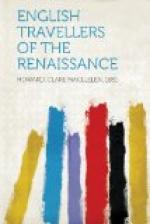It is likely that some of these accusations were true. Italy more than any other country charmed the Elizabethan Englishman, partly because the climate and the people and the look of things were so unlike his own grey home. Particularly Venice enchanted him. The sun, the sea, the comely streets, “so clean that you can walk in a Silk Stockin and Sattin Slippes,"[109] the tall palaces with marble balconies, and golden-haired women, the flagellants flogging themselves, the mountebanks, the Turks, the stately black-gowned gentlemen, were new and strange, and satisfied his sense of romance. Besides, the University of Padua was still one of the greatest universities in Europe. Students from all nations crowded to it. William Thomas describes the “infinite resorte of all nacions that continually is seen there. And I thinke verilie, that in one region of all the worlde againe, are not halfe so many straungers as in Italie; specially of gentilmen, whose resorte thither is principallie under pretence of studie ... all kyndes of vertue maie there be learned: and therfore are those places accordyngly furnisshed: not of suche students alone, as moste commonly are brought up in our universitees (meane mens children set to schole in hope to live upon hyred learnyng) but for the more parte of noble mens sonnes, and of the best gentilmen: that studie more for knowledge and pleasure than for curiositee or luker: ... This last wynter living in Padoa, with diligent serche I learned, that the noumbre of scholers there was little lesse than fiftene hundreth; whereof I dare saie, a thousande at the lest were gentilmen."[110]
The life of a student at Padua was much livelier than the monastic seclusion of an English university. He need not attend many lectures, for, as Thomas Hoby explains, after a scholar has been elected by the rectors, “He is by his scholarship bound to no lectures, nor nothing elles but what he lyst himselfe to go to."[111] So being a gentleman and not a clerk, he was more likely to apply himself to fencing or riding: For at Padua “there passeth no shrof-tide without rennyng at the tilte, tourneiyng, fighting at the barriers and other like feates of armes, handled and furnisshed after the best sort: the greatest dooers wherof are scholers."[112]




